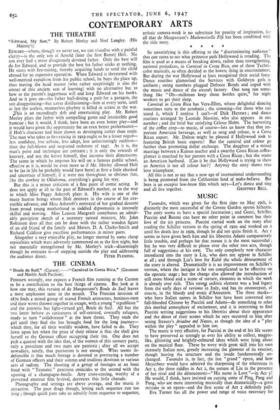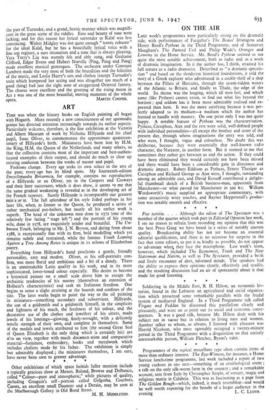MUSIC
Turandot, which was given for the first time on May 29th, is distinctly the most successful of the Covent Garden operas hitherto. The story seems to have a special fascination ; and Gozzi, Schiller, Puccini and Busoni can have no other point in common but their love of the icy princess. Puccini started work on the story after reading the Schiller version in the spring of 1920 and worked on it until his death late in r929, though he did not quite finish it. Act I seems to have given both him and his librettist Adami comparatively little trouble, and perhaps for that reason it is the most successful ; but he was very difficult to please over the other two acts, though full of suggestions or his own. The only completely new character introduced into the story is Liu, who does not appear in Schiller at all ; and through Liu's love for ICalaf the whole denouement of the story is altered. Dramatically it is an improvement on Schiller's version, where the intrigue is far too complicated to be effective on the operatic stage ; but the change also allowed the introduction of still more blood and a scene of torture, elements in which the work is already over rich. This strong sadistic element was a bad legacy from the early days of verismo in Italy, and has its counterpart, of cour§e, in the bloody and erotic d'Annunzio. The three masks— who have Italian names in Schiller but have been converted into full-blooded Chinese by Puccini and Adami—do something to relax this morbid atmosphere of excitement, and it is interesting to find Puccini writing suggestions to his librettist about their appearance and the decor of their scenes which he says occurred to hina after seeing Strauss's Ariadne auf Naxos, as though the idea of a i play within the play" appealed to him too.
The music is very effective, for Puccini at the end of his life seems to have preserved as strongly as ever his ability to collect, magpie- like glittering and brightly-coloured ideas which were lying about on magpie-
like, musical floor. These he wove with great skill into his own intensely Italian nest, greatly increasing the glamour of its exterior, though leaving the structure and the inside fundamentally un- changed. Turandot is, in fact, the last " grand " opera, and how Meyerbeer would have admired the sharpening of the whetstone in Act i, the three riddles in Act 2, the torture of Liu in the presence of her rival and the denouement—" His name is Love "—in Act 3! He would, I think, have insisted on cutting -some of Ping, Pang and Pong, who are more interesting musically than dramatically—a great mistake •in an opera—and the first scene of Act 2 definitely palls.
Eva Turner has all the power and range of voice necessary for the part of Turandot, and a grand, heroic manner which was magnifi- cent in the great scene of the riddles. Ease and beauty of tone were lacking, and for this reason her lyrical surrender to Kalaf was less convincing. Walter Midgley was not quite enough " tenore robusto " for the ideal Kalaf, but he has a beautifully lyrical voice with a fine top register, a sure intonation and a tone that is always pleasing. Vera Terry's Liu was warmly felt and ably sung, and Grahame Clifford, Edgar Evans and Hubert Norville (Ping, Pang and Pong) made excellent musical grotesques. The orchestra under Constant Lambert made the very most of both the brutalities and the felicities of the music, and Leslie Hurry's sets and clothes (except Turnadot's train which hampered her acting and was altogether too much of a good thing) had just the right note of exaggerated Oriental fantasy. The chorus were excellent and the greeting of the rising moon in Act I was one of the most beautiful, moving moments of the whole



































 Previous page
Previous page